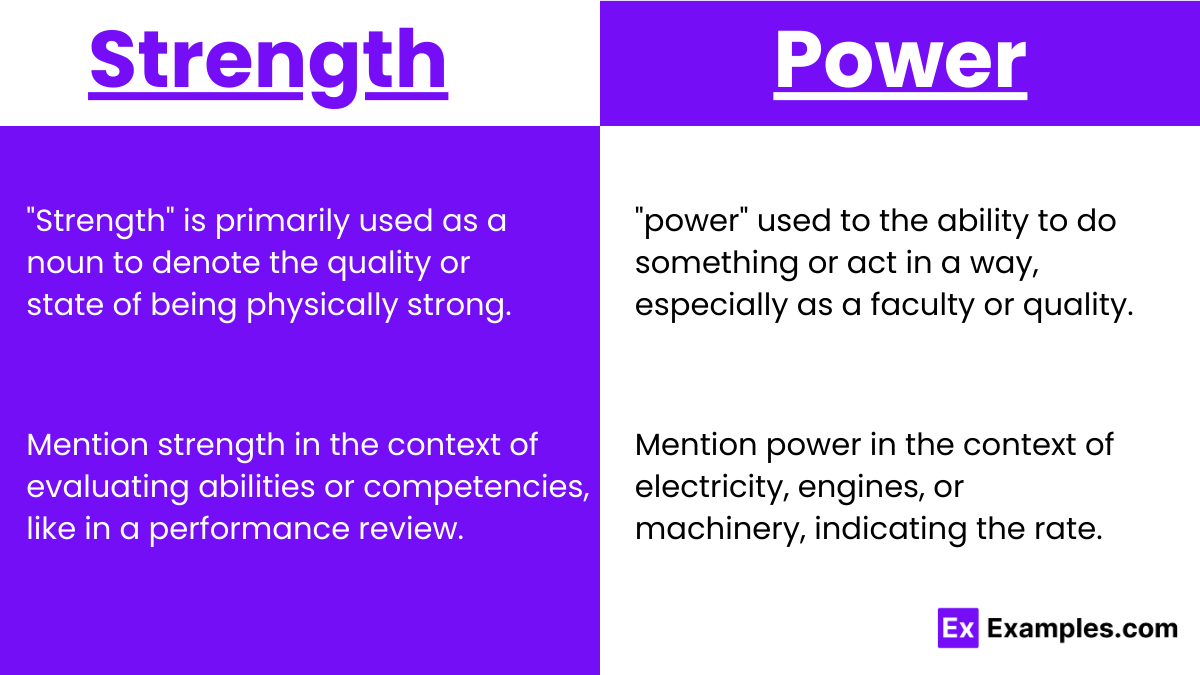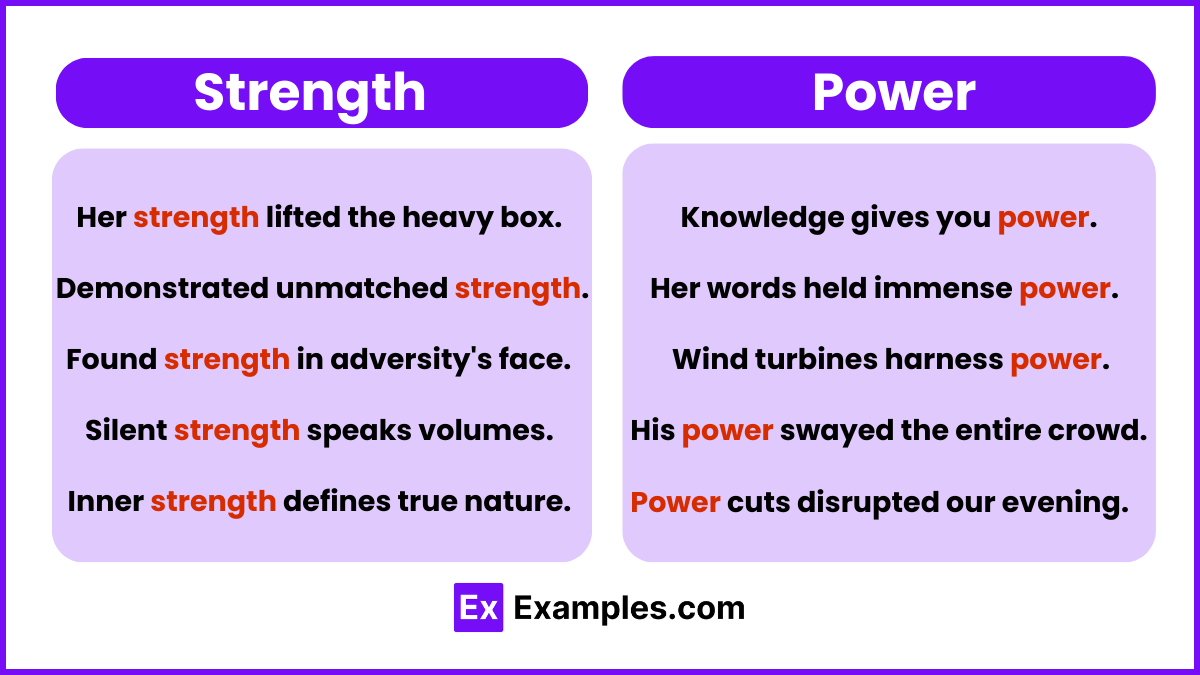Strength vs Power
In the fields of fitness, athletics, and physical health, the terms “strength” and “power” frequently arise, each carrying its own significance for individuals aiming to enhance their physical capabilities. While they might seem synonymous at a glance, distinguishing between strength and power is pivotal for tailoring training strategies and achieving specific fitness goals. Grasping the subtle distinctions between these two facets can not only optimize physical performance but also prevent injuries and ensure a balanced approach to physical development.
Strength and Power – Meanings
- Strength: This term refers to the maximal amount of force that a muscle or group of muscles can exert in a single effort. Strength is the bedrock of physical capacity, essential for tasks that require heavy lifting or resistance. It’s measured by how much weight one can lift, push, or pull in exercises like squats, bench presses, or deadlifts.
- Power: Power combines both speed and strength, focusing on performing work or exerting force in the shortest time possible. It’s about how quickly you can use your strength in dynamic movements, often seen in explosive actions like sprinting, jumping, or throwing. Power is essential in activities that require a burst of speed and force, such as in many athletic competitions.
Summary
Strength refers to the ability to exert force on physical objects over a period, emphasizing endurance and the capacity to perform tasks like lifting and holding. It’s about muscle endurance and sustained effort. Power, on the other hand, combines strength with speed, focusing on the rapid application of force. It’s crucial in activities requiring quick, explosive movements. While strength builds a foundation, power is about applying that strength efficiently and swiftly.
How to Pronounce Strength and Power
- Strength: Pronounced as /strɛŋkθ/, this one-syllable word emphasizes a robust “streng” sound, ending with a hard “th” that highlights the concept of forceful capacity.
- Power: Pronounced as /ˈpaʊər/, this two-syllable word starts with a strong “pow” sound, resembling the word “pounce,” ending with a softer “er,” reflecting the dynamism and force.
Differences between Strength and Power
| Aspect | Strength | Power |
|---|---|---|
| Definition | Maximal force a muscle can exert. | Speed of applying force in dynamic movements. |
| Measurement | Quantified by maximum weight lifted. | Combination of strength and speed. |
| Focus | Purely on force generation. | On rapid exertion of strength. |
| Key Exercises | Squats, bench presses, deadlifts. | Sprints, jumps, explosive lifts. |
| Importance | Foundational for heavy lifting. | Essential in sports requiring quick actions. |
How to Remember the Difference between Strength and Power
Consider “strength” as the foundational force your muscles can produce, like the engine of a car that determines how much it can pull. “Power,” however, is how quickly and explosively you can use that force, akin to how fast a car can go from 0 to 60 mph. Strength is your muscle’s maximum capacity, while power is using that capacity swiftly and efficiently.
When to Use Strength and Power

Usage of Strength
- Physical Endurance: Refer to strength when discussing the capacity to carry, lift, or sustain physical activity over time, like in weight training or endurance sports.
- Inner Resilience: Use it to describe emotional or mental fortitude, such as enduring difficult situations or showing resilience in the face of challenges.
- Structural Stability: Apply the term when talking about the durability and robustness of structures or materials, indicating their ability to withstand forces or pressures.
- Capability Assessment: Mention strength in the context of evaluating abilities or competencies, like in a performance review, to indicate areas where someone excels or is particularly capable.
Usage of Power
- Explosive Actions: Use power when referring to activities that require a quick, forceful effort, such as sprinting, jumping, or throwing.
- Authority or Influence: Apply it to describe someone’s ability to exert influence, control, or authority over others or situations, often used in political or organizational contexts.
- Energy Output: Mention power in the context of electricity, engines, or machinery, indicating the rate at which work is done or energy is transferred.
- Effectiveness: Use it when discussing the potency or effectiveness of something, such as a powerful speech that moves people emotionally or a powerful medicine that acts quickly.
How to Use Strength and Power
Using Strength
As a Noun: “Strength” is primarily used as a noun to denote the quality or state of being physically strong, the capacity for enduring or withstanding pressure, or the intensity of a force or power. For example, “Her strength allowed her to win the competition,” or “The strength of the wind was incredible.”
Using Power
- Noun: As a noun, “power” refers to the ability to do something or act in a particular way, especially as a faculty or quality. It can also denote the capacity or ability to direct or influence the behavior of others or the course of events. For example, “The power of the storm was terrifying,” or “He has the power to change the outcome.”
- Verb: “Power” can also be used as a verb, meaning to supply a device with mechanical or electrical energy, or to move or travel with great speed or force. For example, “This car is powered by electricity,” or “The boat powered through the waves.”
Strength and Power – Examples

Examples of Strength
- “Regular strength training can significantly increase your muscle force.”
- “She demonstrated her strength by lifting twice her body weight.”
- “Increasing your strength can enhance overall physical performance.”
- “Strength exercises are crucial for building a solid muscle foundation.”
Examples of Power
- “Power training is key for athletes requiring quick bursts of speed.”
- “His jump demonstrates incredible power and agility.”
- “Incorporating power exercises can improve your athletic explosiveness.”
- “Power-focused workouts enhance both strength and speed.”
Synonyms
| Term | Synonyms |
|---|---|
| Strength | Force, robustness, might |
| Power | Energy, vigor, potency |
Exercise
Fill in the blanks with either “strength” or “power” to complete the sentences accurately.
- Her _______ training regimen includes heavy deadlifts and squats.
- The sprinter’s _______ was evident in his explosive start.
- Building core _______ is essential for overall physical stability.
- His _______ in the shot put event led to a new school record.
- The workout focuses on lower-body _______ for enhanced jump performance.
Answers
- strength
- power
- strength
- power
- power
FAQ’S
What is the difference between power and strength?
Power involves speed and force, while strength is the ability to exert maximal force, regardless of time.
What is the difference between strength and energy?
Strength is physical force exertion capability, whereas energy refers to the capacity to perform work or activity.
Does power come from strength?
Yes, power is derived from strength, but it also incorporates speed and the ability to exert force quickly.
Should you do strength or power first?
Focus on strength training first to build a solid foundation, then incorporate power exercises for dynamic movements.
Can you have power without strength?
Power requires a base level of strength; without it, one’s ability to exert force quickly is limited.
How do you train for power instead of strength?
For power, prioritize explosive, high-velocity exercises like plyometrics, and Olympic lifts over slow, heavy lifting.


